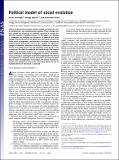| dc.contributor.author | Acemoglu, Daron | |
| dc.contributor.author | Egorov, Georgy | |
| dc.contributor.author | Sonin, Konstantin | |
| dc.date.accessioned | 2012-07-26T18:05:34Z | |
| dc.date.available | 2012-07-26T18:05:34Z | |
| dc.date.issued | 2011-12 | |
| dc.date.submitted | 2011-01 | |
| dc.identifier.issn | 0027-8424 | |
| dc.identifier.issn | 1091-6490 | |
| dc.identifier.uri | http://hdl.handle.net/1721.1/71844 | |
| dc.description.abstract | Almost all democratic societies evolved socially and politically out of authoritarian and nondemocratic regimes. These changes not only altered the allocation of economic resources in society but also the structure of political power. In this paper, we develop a framework for studying the dynamics of political and social change. The society consists of agents that care about current and future social arrangements and economic allocations; allocation of political power determines who has the capacity to implement changes in economic allocations and future allocations of power. The set of available social rules and allocations at any point in time is stochastic. We show that political and social change may happen without any stochastic shocks or as a result of a shock destabilizing an otherwise stable social arrangement. Crucially, the process of social change is contingent (and history-dependent): the timing and sequence of stochastic events determine the long-run equilibrium social arrangements. For example, the extent of democratization may depend on how early uncertainty about the set of feasible reforms in the future is resolved. | en_US |
| dc.language.iso | en_US | |
| dc.publisher | National Academy of Sciences of the United States of America | en_US |
| dc.relation.isversionof | http://dx.doi.org/10.1073/pnas.1019454108 | en_US |
| dc.rights | Article is made available in accordance with the publisher's policy and may be subject to US copyright law. Please refer to the publisher's site for terms of use. | en_US |
| dc.source | PNAS | en_US |
| dc.title | Political model of social evolution | en_US |
| dc.type | Article | en_US |
| dc.identifier.citation | Acemoglu, D., G. Egorov, and K. Sonin. “Colloquium Paper: Political Model of Social Evolution.” Proceedings of the National Academy of Sciences 108.Supplement_4 (2011): 21292–21296. Copyright ©2011 by the National Academy of Sciences | en_US |
| dc.contributor.department | Massachusetts Institute of Technology. Department of Economics | en_US |
| dc.contributor.approver | Acemoglu, K. Daron | |
| dc.contributor.mitauthor | Acemoglu, Daron | |
| dc.relation.journal | Proceedings of the National Academy of Sciences of the United States of America | en_US |
| dc.eprint.version | Final published version | en_US |
| dc.type.uri | http://purl.org/eprint/type/JournalArticle | en_US |
| eprint.status | http://purl.org/eprint/status/PeerReviewed | en_US |
| dspace.orderedauthors | Acemoglu, D.; Egorov, G.; Sonin, K. | en |
| dc.identifier.orcid | https://orcid.org/0000-0003-0908-7491 | |
| mit.license | PUBLISHER_POLICY | en_US |
| mit.metadata.status | Complete | |
